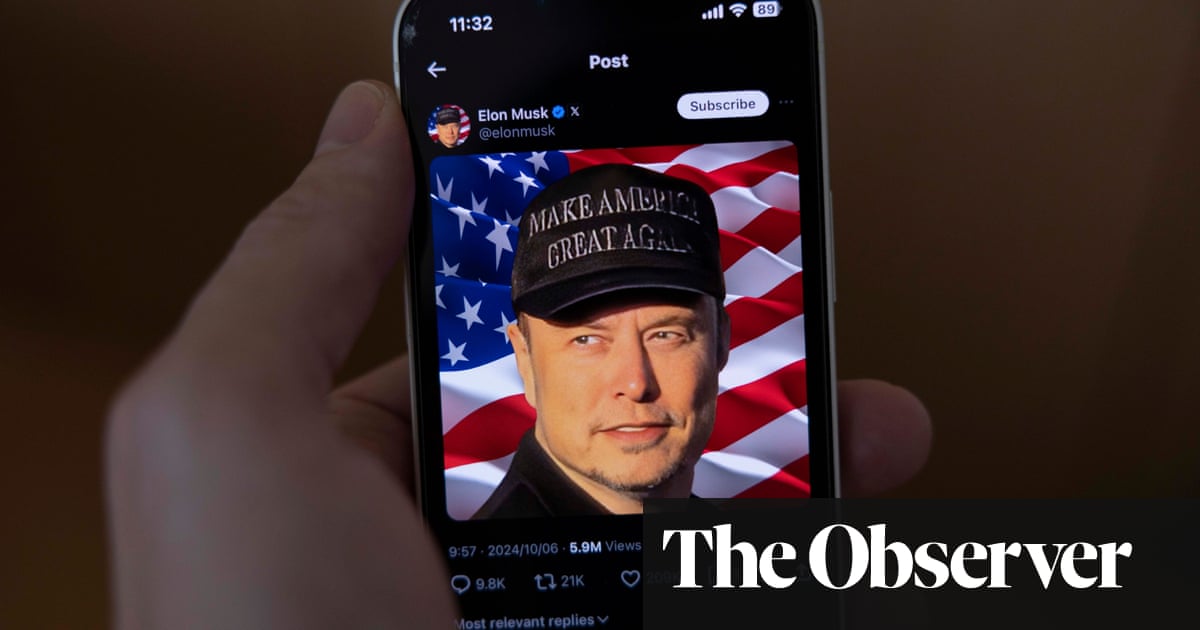Two years ago, there was some trepidation among advertisers, anti-hate-speech groups and staff about Elon Musk’s acquisition of Twitter.
Those concerns have been borne out: advertisers have sharply reduced spending on the platform, Musk has sued nonprofits over their coverage of a rise in controversial content and about eight out of 10 employees have been sacked.
The service, now rebranded as X, is not worth the $44bn Musk paid for it on 27 October 2022 – later tweeting “the bird is freed” in a reference to its corporate logo. The plunge in value reflects the damage done to its advertising-dependent business model.
But its continued influence as a news source and its role as an outlet for broadcasting its owner’s rightwing views to his 200 million-plus followers, means the benefit to the world’s richest person does not need to be measured in financial benchmarks alone.
“It’s still setting the political agenda and has had some success in promoting his libertarian views,” says Nic Newman, a senior research associate at the Reuters Institute for the Study of Journalism.
Worldwide traffic on X is up compared with a year ago, according to data from Similarweb, with 4.3bn desktop and mobile web visits, a 3.8% rise on the same period last year. However, that number was running at 5bn before the Tesla chief’s takeover.
Growth on the platform is also slowing in terms of users, with the Financial Times reporting that the number of global daily users in the second quarter of this year was 251 million – though that was still a rise of 1.6% on the same quarter in 2023.
But under the old Twitter model, those user numbers would be expected to lure in advertisers keen to push their message on a social media site that was valued for its ability to get people talking.
Yet advertisers have shied away from a platform that, under the ownership of a self-confessed “free speech absolutist”, has allowed the reinstatement of accounts belonging to British far-right activist Tommy Robinson, misogynist influencer Andrew Tate and US conspiracy theorist Alex Jones.
Investment group Fidelity recently wrote down the value of its small stake in X, implying that the platform now has a value of $9.4bn. This reflects a slump in advertising revenue, an income stream that accounted for nearly 90% of Twitter’s $5.1bn in annual revenue in 2021, the last year for which it published annual results as a listed company.
after newsletter promotion
Musk’s latest reaction to that boycott is unlikely to win back advertisers. In August, X sued a global advertising alliance and several large companies, including big advertisers such as Unilever and Mars, accusing them of conspiring to boycott the platform and cause it to lose money.
X’s chief executive, Linda Yaccarino, an advertising industry veteran, said last year that the historically loss-making platform could turn a profit in 2024, having slashed costs – and said advertisers were returning. The company also has to service a $13bn debt burden, placed on its balance sheet as part of the financing for the takeover, at a cost of $300m a quarter.
Advertising experts say the platform remains off-bounds for many big brands. “X has definitely dropped off the radar for a lot of advertisers who previously would have included it in their media mix,” says Farhad Divecha, managing director of the London-based digital marketing agency AccuraCast. “I don’t see them going back to X now that Musk has made it abundantly clear that he doesn’t care about ad revenue and would rather maintain X as a loosely moderated platform that could pose significant brand risk.”
Lou Paskalis, chief executive of AJL Advisory, an advertising consultancy, says that under the Tesla billionaire’s ownership, X is “not brand-safe at all”, which is “largely because of Musk’s rhetoric”.
Referring to its owner’s ambition to turn X into an “everything app” akin to China’s WeChat, Paskalis adds: “I am assured there is a future business at X that will reinvent how it realises revenue. But I have seen no evidence of that.”
With a $270bn fortune, Musk can sustain X financially, but Newman says that he will weigh the cost of the deal against the publicity for his political views, his even higher public profile since the takeover and whether his personal and financial support for Donald Trump pays off at the US presidential election next month.
“Whether all that was worth $44bn remains an open question and may partly depend on whether a grateful Trump is re-elected,” adds Newman.
X was approached for comment.
